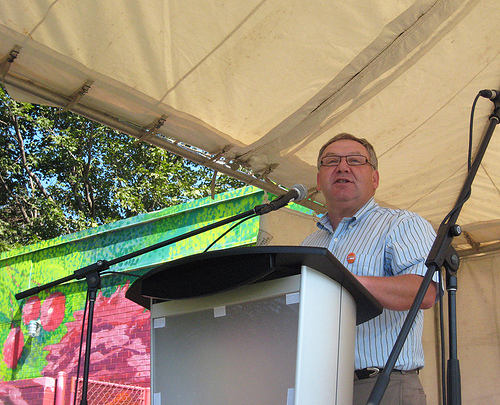The last couple of polls indicate that Nova Scotia’s NDP government is on the skids.
If that’s so, here’s a view of the shoals ahead for our once-again lurching ship: at the next election we’ll have a choice of three parties on the skids.
The fact is that the opposition parties are still broken fragments of the old order, yet to reconstitute themselves as serious contenders for government.
Although they’ve made some occasional good points, they have yet to present themselves in more than just point-scoring mode.
All but completely ignored by the government until now, they weren’t even the real opposition over the past three years. On major issues on which over half the population opposed the government’s stand — among others the convention centre, sustainable forestry, biomass, open-pen fish farming — they mostly had nothing to say, or silently agreed with the government.
The opposition came from within the broader NDP itself.
If this is symptomatic of the larger political picture, then the parties in Nova Scotia would actually look like this if aligned with the population: the Liberals and Tories would fold into the NDP as one centrist party; an anti-government/anti-tax party (the Atlantica Party?) would form to the right, taking part of the Conservative Party; and a communitarian/environmental party (the Greens?) would form to the left in the place where the NDP used to be.
The Liberal surge (up to 41 per cent support, with the NDP at 31 and the Tories at 22, albeit with almost half undecided) is certainly startling.
The rise came mainly at the expense of the Tories (down six points from the previous poll). Over the past three years, the Tories actually seemed to me more informed and more to the point in opposition than the Liberals, although admittedly not in an attention-grabbing way.
Pollster Don Mills ascribed the Liberal rise to an ad campaign against high power rates, power company profits and education cuts, skimming off some hot-topic popularity.
I’d add this. When you’re grasping at straws, the Liberals would be the easiest straw to grab. They’ve been out of power the longest, Leader Stephen McNeil is a pleasant guy with a soft image, and they’ve taken a lesser hit than the Tories on the illegal expenses scandal, with former Tory cabinet minister Richard Hurlburt and his trial much in the news recently, getting more problematic ink than the Liberals’ Dave Wilson.
In other words, if you’re annoyed with everybody, it would be easy to be least annoyed with the Liberals.
What now? I mentioned the NDP’s internal opposition. This is a serious rift, although it’s been discreet. Many who did the hard work at election time and gave the party its rising energy over the last 30 years have been disillusioned by the government’s direction.
Some 45 prominent long-time supporters wrote a letter to caucus last June saying they were “trying to see the point” of continuing their support of what seemed to be “not a party of change” — one which was cutting health care and education while spending on questionable industrial projects.
Fish farms, biomass, forestry etc. have cost more support. I suspect the NDP’s declining numbers are mainly supporters parking themselves in the “undecided” column.
Now, apparently, the sides are talking, and it could be a main feature of the NDP’s attempt to remake itself in the next year. The NDP needs this support if it’s going to win again. But communication is one thing the NDP hasn’t been good at — neither inside nor outside the party, except for ex-finance minister Graham Steele with his cross-province consultations.
Meanwhile, the NDP’s problem is also the problem of governments everywhere as the world economy flattens, maybe for good.
I was looking at figures on French President François Hollande. He got elected, sat down, and before doing anything his popularity plunged 20 points. It’s like that for leaders everywhere except where money is gushing out of the ground, like Saskatchewan and Alberta.
Like President Obama, Premier Dexter inherited huge and worsening problems that he can’t untangle and he is being blamed for them. For the voter fiddling with the stubby pencil in the election booth a year from now, and annoyed with the NDP, the question will be: how soon do you return the characters who created the problems to begin with?
As for the Liberals, it remains to be seen whether their newfound support stands when the finger of public attention turns to them, and whether they have anything to follow up with. I must admit, they have at least provoked a debate on the electricity market — the first real opposition-created debate on anything since the last election.
As for the Conservatives, I don’t know why they’re not getting any respect. Is it possible that they’re dragging Stephen Harper at anchor like conservative parties in other provinces?
Ralph Surette is a veteran journalist living in Yarmouth County. This article was first published in the Chronicle Herald.
Photo: ahblair/Flickr
What’s Harper up to? Award-winning journalist Karl Nerenberg keeps you in the know. Donate to support his efforts today.



